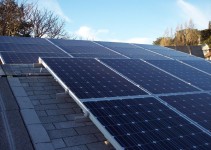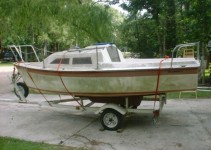Richard left us a message asking about deck cleaning techniques. The answer: Apply the Deck QSE or Wood OX Cleaner to either a wet or dry decking (wood or composite including pressure treated lumber, yellawood, trex, etc.). QSE Deck Cleaner Application can be via a paintbrush, mop & dip bucket, Bug Sprayer or even just a bucket an sponge. After waiting 25 minutes, rinse with a narrow jet from a garden hose, or ideally a fan spray from a power washer.
deck cleaning questions:
I have 2 questions about Deck Cleaner QSE
First wet or dry?
So do I wet the deck first before spraying it. Or do I spray the cleaner on a dry deck?
Second ideal applicator?
I read that I can use a bug sprayer, but I was thinking, instead of spraying, can I brush it on the paintbrush? I don’t have a sprayer and I was just wondering, I got tons of paintbrush. And I’m just curious if paint brushes would work also. So brush it on with a paintbrush or it’s that a big no, no?
Deck Cleaner QSE Answers
Wet or Dry
It’s your choice whether you want to work with a wet or dry surface. Each has advantages that can vary by your state and season.
Dry Deck Cleaning Pros & Cons:
On the Pro Side when the deck is dry, it’s much easier to determine the surfaces you where you have already applied the cleaner, because those boards will be visibly wet. Ideal for Spring or Fall deck cleaning in mild weather communities. Or early morning cleaning in hotter areas.
The downside to applying the deck cleaner to a dry surface occurs in southern and western states, as well as most places during the heat of summer. When you apply any liquid to hot surface depending on porosity, temperature, cloud cover and relative humidity some degree of the solution will evaporate. Leaving a more concentrated solution in its place. So to avoid deck cleaner concentration issues, it’s best not to apply during extreme temperatures.
Wet Deck Cleaning Advantages and Disadvantages
The main draw back to using a deck cleaner on wet decking, and that is the risk that the cleaner’s dilution ratio will be extended making the cleaning solution less potent or said alternately, making it more lean. This situation is made even worse, if attempting to clean during active rain storms. Just to be clear, we never recommend deck cleaning during active rain storms, thunder might be annoying, but lightning can put an end to your deck cleaning today and forever.
A secondary drawback to wet cleaning is just keeping track of which areas are just wet, and what surfaces already have the cleaner soaking. There is not a risk of non-uniform application, because the cleaner won’t “over clean”, the risk is missing an area which will become obvious once things dry out and the algae, mold and mildew is still in place (you can re-clean those areas easily enough).
The advantage to wet cleaning is that the decking surface will not be scorching hot and so there will be no loss of cleaning power.
Wet vs Dry Recommendation:
The best way to consider cleaning your deck is to ensure that the surface is cool… Probably the simplest way to determine whether to wet or forget is to kick off your shoes and socks and put your bare feet on the decking.. Can’t stand there? Too hot? Then wet the decking so that it can be stood on. (Ok, you could also just bend down and feel the surface with your hand if you aren’t crazy about being barefoot or burning your sole). Why not base this on air temperature and clouds and .. and … and ….
That’s why, because there are too many factors, even the type of decking will cause variations in temperatures…
So if the deck is HOT, wet it until it’s NOT
Ideal Applicator
When it comes to application, the main thing is to just get the cleaner on the surface..
Typically home owners have a bug sprayer handy, or in some cases a back pack sprayer, but really a sponge and bucket would work..
And yes, to answer Richard’s question, a paintbrush would also work just fine to apply the deck cleaner.


